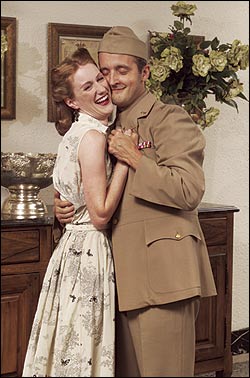![]() Much Ado About Nothing
Much Ado About Nothing
Taproot Theatre; ends Sat., Oct. 23
Much Ado is unique among Shakespeare’s plays in that the characters speak predominantly in prose rather than the Bard’s typically lofty free verse; iambic pentameter is employed sparingly, to special effect, and pretty much stands out like a sore thumb. The majority of the play’s dialogue—and the chatter seems supremely dialogue-ish—has a more breathless, bantering, aggressive thrust than usual, more Howard Hawks romantic comedy than Elizabethan pose and riposte. Strong comic actors with good timing and verbal chops can truly hit stride with this material, which also has the benefit of being highly adaptable to modern relocation.
Director Scott Nolte gives Taproot’s production a nice twist, setting the play in rural New York near the end of the Second World War; the social anxieties and upheavals of that topsy-turvy era provide a rich background for a play so singularly concerned with the subjects of truth, dignity, and “the false, sweet bait” of romantic subterfuge. The play can be taken in any number of directions, and Nolte evinces solid dramatic instincts in nudging the ambience toward the sort of madcap romantic comedies that traffic in compound miscommunication, zippy put-downs, and elaborate foreplay. The feel of Nolte’s production is thoroughly modern—it’s less about love per se than the tangles we get ourselves into in the name of it.
Much Ado is driven by two distinct, simple plot lines: the grudging, adversarial blossoming of love between razor-witted Beatrice (Candace Vance) and clowning Bennedick (Timothy Hornor), and the trials of Hero (Jesse Notehelfer) and Claudio (Robert Martin), whose matrimonial bliss is threatened by false accusations of Hero’s whorishness. The latter story feels a bit flat and fusty in this production, especially when compared to the wonderful waltz executed by Vance and Hornor, who inject the drama of Beatrice and Bennedick with smart-assed sexual tension and a hyperkinetic repartee. Hornor almost single-handedly takes the play to a better place: He is easeful, bright, full of grace, and wildly funny, and his luminous, relaxed presence telegraphs the warm comic generosity of, say, a young Jimmy Stewart. And Vance, with her wisecracking, Sex and the City weltschmerz, is the perfect foil. These two excellent folk shine a salutary glow upon the rest of the cast, levitating the whole shebang above the merely good and into noteworthy status. RICHARD MORIN
![]() The Tragedy of Romeo and Juliet
The Tragedy of Romeo and Juliet
McCaw Hall; ends Sun., Oct. 3
Pacific Northwest Ballet artistic director Kent Stowell gets right to it at the beginning of his Shakespeare adaptation, staging a funeral procession followed by a brawl in the opening moments of the ballet. From the start, we know he’s taking no prisoners.
The brisk pace continues throughout most of the work, with Ming Cho Lee’s set of arches and colonnades deftly sliding in and out of each scene, and mimetic gestures kept to a minimum. Indeed, if you didn’t know the story or hadn’t read the program notes, you could miss some crucial details—Juliet’s nurse explaining to her exactly who Romeo is and why that’s a problem, and Friar Lawrence debating whether or not to help Romeo marry Juliet are almost swept away in the general back and forth.
But the pacing serves to heighten the overall tension, and when the timing opens up during the two big pas de deux for the main characters, the contrast draws our attention. In both the balcony scene and the “morning after” in Juliet’s bedchamber, the characters are apprehensive about time but neither duet feels rushed. Stowell has said he wanted to focus attention on the young lovers rather than on the hubbub of their world, and he establishes that balance here.
The opening night leads, Patricia Barker and Jeffrey Stanton, have performed this ballet several times, and their familiarity with their roles is evident. Barker is especially compelling in the potion scene, making sense out of the gradual effects of the poison during the long solo. Her innate poise makes her less convincing as an impulsive young girl during her initial scenes with the nurse, but once she meets Romeo and they fall in love, her equilibrium takes on a fatalistic quality, until at the end, suicide seems the only logical option.
Noelani Pantastico and Le Yin, leading the Saturday matinee cast, make promising debuts in these roles, emphasizing the headstrong youth of the characters. Pantastico, who is also making her debut as a principal dancer, is especially powerful in the bedroom scene as her body crumples under the weight of adult tragedy. The leads are matched by the rest of the cast, with Batkhurel Bold tall and elegant as an imperious Tybalt, and Jonathan Porretta as a very contemporary Mercutio, full of swagger and quicksilver braggadocio, rushing forward to meet his death. SANDRA KURTZ




